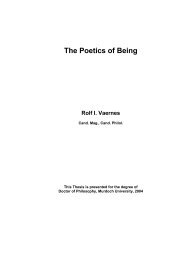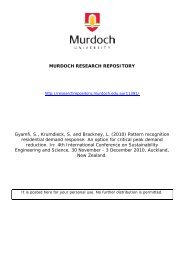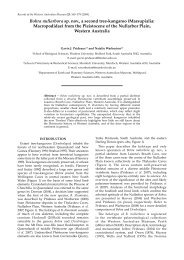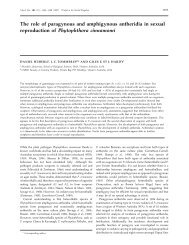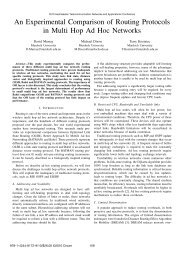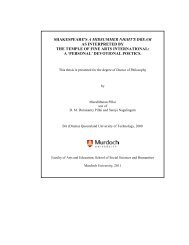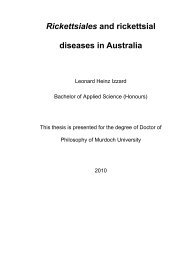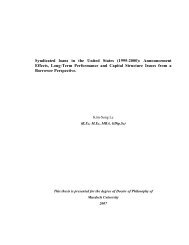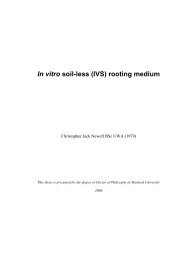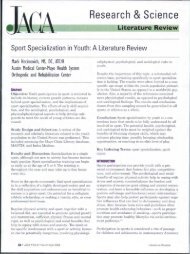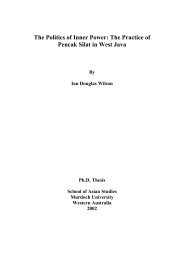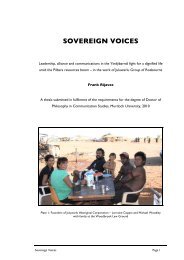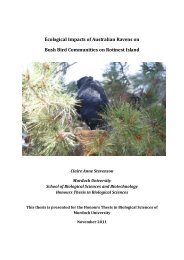National Review of School Music Education - Murdoch Research ...
National Review of School Music Education - Murdoch Research ...
National Review of School Music Education - Murdoch Research ...
Create successful ePaper yourself
Turn your PDF publications into a flip-book with our unique Google optimized e-Paper software.
in the submissions and teacher/principal surveys. In particular, the view is relevant to the Arts<br />
Learning Area adopted by all States and Territories.<br />
Teacher education, both pre-service and in-service, is a significant issue that emerged through<br />
the research undertaken by the <strong>Review</strong>. Time for music in pre-service programmes has in almost<br />
all cases been reduced. In many cases, music has been submerged in the Arts Learning Area. As a<br />
result teachers emerging from these programmes indicate that they lack sufficient knowledge,<br />
understanding and skills and accompanying confidence to teach music.<br />
Similarly, the <strong>Review</strong> identified deficits in music teaching amongst large numbers <strong>of</strong> teachers,<br />
particularly generalist classroom teachers currently teaching in primary and middle schools.<br />
Submissions call for both increased pr<strong>of</strong>essional development for teachers and the alleviation <strong>of</strong><br />
this problem by appointment <strong>of</strong> specialist music teachers in primary and middle schools.<br />
Associated with teacher education, though <strong>of</strong>ten considered separately, is tertiary music education<br />
in conservatories and <strong>School</strong>s <strong>of</strong> <strong>Music</strong>. Many who study to be musicians become teachers,<br />
sometimes in schools. The inclusion <strong>of</strong> music pedagogy in tertiary music programmes needs to be<br />
specifically addressed.<br />
Overall, Part 3 provided the <strong>Review</strong> with a variety <strong>of</strong> perspectives on the concept <strong>of</strong> a quality<br />
music education. The picture <strong>of</strong> music education in Australian schools provided in this section<br />
highlights key factors that contribute to a quality music education:<br />
• Participation, equity and engagement;<br />
• Student achievement <strong>of</strong> music learning outcomes;<br />
• Teacher knowledge, understanding and skills;<br />
• Curriculum articulation;<br />
• Support for teachers and students including that provided by Principals, systems and<br />
sectors;<br />
• Parental and community support; and<br />
• Partnerships with music organisations.<br />
These features were considered in developing the Guidelines for Effective <strong>Music</strong> Programmes presented<br />
in the next section <strong>of</strong> this Report and in the issues, challenges and opportunities focused on in Part<br />
5.<br />
Part 4: Guidelines for Effective <strong>Music</strong> <strong>Education</strong><br />
A major focus <strong>of</strong> the <strong>Review</strong> process has been the development <strong>of</strong> Guidelines for Effective <strong>Music</strong><br />
<strong>Education</strong>.<br />
These Guidelines were designed to help inform judgements by the <strong>Review</strong> team, and have been<br />
redeveloped to provide systems and sectors with a basis for making judgements on the overall<br />
health <strong>of</strong> school music education. As well, they provide tools for individual schools to review the<br />
health <strong>of</strong> their own programmes. And they provide parents, communities, music organisations and<br />
others a guide for reviewing their contributions to school music.<br />
These Guidelines as a whole enable us to answer the following questions:<br />
• How will we know if and how well students are learning music?<br />
• How will we know if Australian schools are maximising that music learning?<br />
They build on existing State/Territory and other curriculum statements and are not designed to<br />
replace them.<br />
These Guidelines are based on the two broad assumptions outlined in Part 2.2, the Framework for<br />
undertaking this <strong>Review</strong>:<br />
• Every Australian child is capable <strong>of</strong> learning music; and<br />
• Every Australian school is capable <strong>of</strong> supporting effective learning in music.<br />
These assumptions reinforce a commitment to music as an integral part <strong>of</strong> a broad, comprehensive<br />
and balanced education that prepares students to participate in the emerging society in which they<br />
live. These assumptions recognise that while some students will make a specialised study <strong>of</strong> music,<br />
the majority <strong>of</strong> students learn music as part <strong>of</strong> a general education. Although some students may<br />
FINAL REPORT xiii



